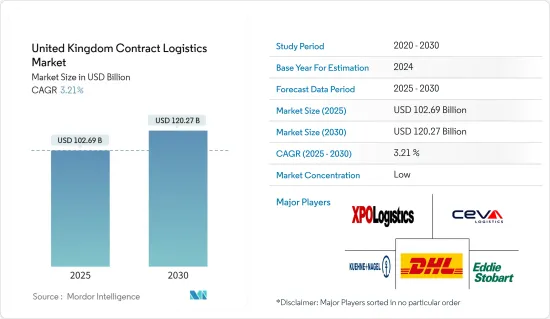
|
시장보고서
상품코드
1689852
영국의 계약 물류 시장 : 점유율 분석, 산업 동향, 성장 예측(2025-2030년)United Kingdom Contract Logistics - Market Share Analysis, Industry Trends & Statistics, Growth Forecasts (2025 - 2030) |
||||||
영국의 계약 물류 시장 규모는 2025년 1,026억 9,000만 달러로 추정되며, 예측 기간 중(2025-2030년) CAGR 3.21%로 확대되어, 2030년에는 1,202억 7,000만 달러에 달할 것으로 예측됩니다.

주요 하이라이트
- 2020년 3월 이후 물류산업은 업무상 재무상의 큰 혼란에 직면하고 있음에도 불구하고 식료품이나 PPE 등의 물자를 국가에 계속 공급했습니다. 물류 기업은 업무 축소, 내제화, 제3자 서비스에 대한 의존도를 낮추는 것으로 리스크 관리를 실시했습니다.
- 영국은 유럽에서 가장 진보된 물류산업입니다. 전자상거래의 다양성과 보급률이 높아 따라 이 상황은 변하지 않을지도 모릅니다.
- 국제무역의 확대와 경제의 상호 연결에 따라 영국의 기업은 점점 세계의 사업활동에 종사하게 되어 왔습니다.
- 운송망 확대의 필요성, 세계공급망의 복잡화, 기술의 진보, E-Commerce의 대두는 모두, 영국에서의 계약 물류의 성장과 진화에 영향을 주고 있습니다.
- 계약 물류 서비스는 소매업의 전자상거래 붐의 결과, 수요가 높아지고 있습니다. 세계 기타 지역과 보조를 맞추기 위해, 영국에서의 인터넷 쇼핑의 확대는 경이적인 것이 되고 있습니다.
영국의 계약 물류 시장 동향
제조업의 계약 물류 수요 증가
- 영국의 제조업은 자동차, 항공우주, 제약, 일렉트로닉스 등 다양성이 풍부합니다.
- 제조업 계약 물류의 주요 이점 중 하나는 유연성의 향상입니다.
- 계약 물류 공급자는 제조업체의 특정 요구에 맞게 맞춤형 솔루션을 제공하므로 시장 환경의 변화에 신속하게 대응할 수 있습니다.
- 물류 업무를 전문가에게 아웃소싱함으로써 제조업체는 합리화된 프로세스, 최적화된 라우팅, 재고관리 개선에서 이익을 얻을 수 있습니다.
- 계약 물류는 공급 체인의 가시성과 추적성을 확보하는데 있어서도 중요한 역할을 하고 있습니다.
시장 발전을 지원하는 전자상거래 성장
전자상거래 산업의 현저한 성장과 소비자의 온라인 쇼핑 지향 증가는 영국 시장에 밝은 전망을 가져오는 주요 요인 중 하나입니다. 이 솔루션의 보급은 다양한 전자상거래 플랫폼이 유연한 추적 기능과 함께 제공하는 단순한 반품 및 환불 정책 등 리버스 로지스틱스 업무 증가에도 기인하고 있어 시장 성장의 원동력이 될 것으로 예상됩니다.
게다가 여러 산업분야에서 물류가 널리 이용되고 있는 것도 투자의 삭감, 배송 시간의 단축, 관리 업무보다 소비자 중시 등 물류의 장점에 대한 의식이 높아짐에 따라 성장 요인 중 하나 기술 주도의 물류 서비스와 사물인터넷(IoT) 대응 커넥티드 디바이스의 도입으로 물체 추적 및 운송 프로세스 요소의 원격 제어가 가능해진 것이 시장 성장의 원동력이 되고 있습니다.
게다가 지속가능한 개발에 대한 관심이 높아지면 그린 물류에 대한 수요를 높여 시장의 성장을 지지하고 있습니다. 가 등의 기타 요인도 시장 성장을 뒷받침할 것으로 예상됩니다.
곧 영국에서는 드론에 의한 배송이 일반적이 될 가능성이 있습니다. 동시에, 하이퍼로컬 서비스가 기업의 상품 배송을 지원하는 것으로, 대형 소매업체로부터의 E-Commerce 주문의 라스트 원 마일 배송이 신속하게 행해질 것으로 예상됩니다.
영국의 계약 물류 산업 개요
시장은 비교적 세분화되어 있으며 DHL Supply Chain, Wincanton, Clipper Logistics, UPS를 주요 기업으로 하는 국내외 진입기업이 다수 존재하고 있습니다.
영국의 계약 물류 시장은 많은 구매자와 판매자가 시장에서 활동하고 있기 때문에 거의 완전한 경쟁의 예를 보여줍니다.
기타 혜택
- 엑셀 형식 시장 예측(ME) 시트
- 3개월간의 애널리스트 서포트
목차
제1장 서론
- 조사의 전제조건과 시장 정의
- 조사 범위
제2장 조사 방법
제3장 주요 요약
제4장 시장 역학과 인사이트
- 시장 개요
- 시장 역학
- 시장 성장 촉진요인
- 시장을 뒷받침하는 세계화의 진전
- 시장을 강화하는 기술의 진보
- 시장 성장 억제요인
- 시장에 영향을 미치는 인프라의 제한
- 시장에 영향을 미치는 노동력 부족
- 시장 기회
- 시장을 밀어올리는 국제무역
- 전문 서비스가 시장을 밀어 올린다
- 시장 성장 촉진요인
- 산업의 매력 - Porter's Five Forces 분석
- 공급기업의 협상력
- 구매자의 협상력
- 신규 참가업체의 위협
- 대체품의 위협
- 경쟁 기업간 경쟁 관계
- 시장의 기술 동향
- 산업의 규제와 시책
- 산업 밸류체인 분석
- 국내 전자상거래 산업(국내와 국경)에 대한 인사이트
- 애프터 판매/역물류의 맥락에서 계약 물류에 대한 인사이트
- 계약 물류 참가 기업이 제공하는 다양한 서비스 개요
- 화물 운송 비용/운임에 관한 고찰
- 영국 물류 산업에서 브렉시트의 영향에 관한 인사이트
- 시장에 대한 COVID-19의 영향
제5장 시장 세분화
- 유형별
- 인소싱
- 아웃소싱
- 최종 사용자별
- 제조 및 자동차
- 소비재 및 소매
- 의약품 및 의료
- 하이테크
- 기타 최종 사용자(에너지, 건설, 항공우주 등)
제6장 경쟁 구도
- 시장 집중 개요
- 기업 프로파일
- DHL Supply Chain
- UPS
- Wincanton
- XP Supply Chain
- Eddie Sobert
- CEVA Logistics
- Clipper Logistics
- FedEx
- Rhenus Logistics
- EV Cargo*
- 기타 기업(주요정보/개요)
제7장 시장의 미래
제8장 부록
JHS 25.05.07The United Kingdom Contract Logistics Market size is estimated at USD 102.69 billion in 2025, and is expected to reach USD 120.27 billion by 2030, at a CAGR of 3.21% during the forecast period (2025-2030).

Key Highlights
- Despite facing significant operational and financial disruption since March 2020, the logistics industry continued to supply the nation with goods, including food supplies and PPE. To deal with the COVID-19 pandemic, logistics businesses managed risks by scaling back operations, taking work back in-house, and reducing their reliance on third-party services. At the same time, many also focused on their core fleet of vehicles to save costs.
- The United Kingdom has the most advanced logistics industry in Europe. Owing to the variety and higher prevalence of e-commerce, this may not change-the contract logistics market benefits from expanding e-commerce due to increased demand for contract logistics services. As a result of the e-commerce boom, logistics companies are expanding their services.
- With the expansion of international trade and the interconnectedness of economies, companies in the UK are increasingly engaging in global business activities. This has led to a surge in the demand for efficient and streamlined logistics services to facilitate the movement of goods across borders.
- The Need for expanded transportation networks, the complexity of global supply chains, advancements in technology, and the rise of e-commerce have all influenced the growth and evolution of contract logistics in the UK.
- Contract logistics services are in high demand as a result of the retail e-commerce boom. Over the last decade, e-commerce has become the most popular retail trend in the United Kingdom. Even though e-commerce platforms have been around for a long time, they have only recently gained mainstream notice. In order to keep up with the rest of the globe, the expansion of internet shopping in the United Kingdom has been phenomenal.
UK Contract Logistics Market Trends
Growing demand for contract logistics in the manufacturing segment
- The manufacturing sector in the UK is highly diverse, encompassing industries such as automotive, aerospace, pharmaceuticals, electronics, and more. Each industry has its unique logistics requirements, and contract logistics providers specialize in catering to these specific needs. This specialization allows manufacturers to benefit from industry-specific expertise and best practices.
- One of the key benefits of contract logistics in the manufacturing sector is increased flexibility. Manufacturers can scale their logistics operations based on demand fluctuations, ensuring efficient utilization of resources and cost optimization.
- Contract logistics providers offer customizable solutions tailored to the specific needs of manufacturers, allowing them to adapt quickly to changing market conditions.
- By outsourcing logistics activities to experts, manufacturers can benefit from streamlined processes, optimized routing, and improved inventory management. This leads to reduced lead times, lower costs, and enhanced overall operational efficiency.
- Contract logistics also plays a vital role in ensuring supply chain visibility and traceability. With the help of advanced technologies such as track and trace systems, manufacturers can monitor the movement of goods throughout the supply chain. This visibility helps in identifying bottlenecks, optimizing inventory levels, and ensuring timely delivery to customers.
Growth in e-commerce supporting the market advancement
Significant growth in the e-commerce industry and increasing consumer propensity to shop online are among the key factors creating a positive outlook for the UK market. Logistics plays a vital role in the smooth functioning of warehousing, transportation, shipping, and online delivery. The widespread adoption of this solution is also due to the increase in reverse logistics operations, such as simple return and refund policies offered by various e-commerce platforms with flexible tracking capabilities will drive market growth.
In addition, the widespread use of logistics by several industrial sectors is another growth driver due to growing awareness of the benefits of logistics, such as reduced investment, faster delivery times, and a greater focus on consumers rather than administrative tasks. The introduction of technology-driven logistics services and the Internet of Things (IoT)-)-enabled connected devices, enabling the tracking of objects and remote control of elements of the transportation process, is driving the market growth.
Moreover, growing interest in sustainable development has increased the demand for green logistics to support the growth of the market. Furthermore, the prevalence of radio frequency identification (RFID), Bluetooth, and other emerging technologies, such as drone delivery and unmanned vehicles, are having a positive impact on the market growth. Extensive research and development (R&D) activities and other factors, such as increasing demand for safe refrigerated transportation across the country, are expected to boost market growth. The building is equipped with new technology and the latest storage software, further expanding the logistical capacity to manage all services. The e-commerce industry is driving a new era in customer service with extensive automation. The logistics industry is constantly adapting to new technologies and innovations.
Soon, drone deliveries might become more common in the United Kingdom. At the same time, hyperlocal services would help businesses deliver their goods, thus fast-tracking last-mile delivery for a quick turnaround time on e-commerce orders from major retailers.
UK Contract Logistics Industry Overview
The market is relatively fragmented, with a large number of local and international players, including DHL Supply Chain, Wincanton, Clipper Logistics, and UPS as its key players. The market is experiencing expansions, mergers, and acquisitions as players focus on increasing their grasp over the nation as well as the international market.
The UK contract logistics market provides an example of near-perfect competition, as many buyers and sellers are operating in the market. Even though major players have a strong footprint across the region and account for a significant market share, the market is still fragmented to some extent, with many players providing contract logistics services at different levels.
Additional Benefits:
- The market estimate (ME) sheet in Excel format
- 3 months of analyst support
TABLE OF CONTENTS
1 INTRODUCTION
- 1.1 Study Assumptions and Market Definition
- 1.2 Scope of the Study
2 RESEARCH METHODOLOGY
3 EXECUTIVE SUMMARY
4 MARKET DYNAMICS AND INSIGHTS
- 4.1 Market Overview
- 4.2 Market Dynamics
- 4.2.1 Market Drivers
- 4.2.1.1 Increased Globalization boosting the market
- 4.2.1.2 Technological advancements bolstering the market
- 4.2.2 Market Restraints
- 4.2.2.1 Infrastructure limitation affecting the market
- 4.2.2.2 Shortage of Labour force affecting the market
- 4.2.3 Market Opportunities
- 4.2.3.1 International trade boosting the market
- 4.2.3.2 Specialized services boosting the market
- 4.2.1 Market Drivers
- 4.3 Industry Attractiveness - Porter's Five Forces Analysis
- 4.3.1 Bargaining Power of Suppliers
- 4.3.2 Bargaining Power of Buyers
- 4.3.3 Threat of New Entrants
- 4.3.4 Threat of Substitutes
- 4.3.5 Intensity of Competitive Rivalry
- 4.4 Technological Trends in the Market
- 4.5 Industry Policies and Regulations
- 4.6 Industry Value Chain Analysis
- 4.7 Insights into the E-commerce Industry in the Country (both Domestic and Cross-border)
- 4.8 Insights into Contract Logistics in the Context of After-sales/Reverse Logistics
- 4.9 Brief on Different Services Provided by Contract Logistics Players
- 4.10 Spotlight on Freight Transportation Costs/Freight Rates
- 4.11 Insights into the Effect of Brexit in the UK Logistics Industry
- 4.12 Impact of COVID-19 on the Market
5 MARKET SEGMENTATION
- 5.1 By Type
- 5.1.1 Insourced
- 5.1.2 Outsourced
- 5.2 By End-User
- 5.2.1 Manufacturing and Automotive
- 5.2.2 Consumer Goods and Retail
- 5.2.3 Pharmaceuticals and Healthcare
- 5.2.4 Hi-tech
- 5.2.5 Other End-Users (Energy, Construction, Aerospace, etc.)
6 COMPETITIVE LANDSCAPE
- 6.1 Market Concentration Overview
- 6.2 Company Profiles
- 6.2.1 DHL Supply Chain
- 6.2.2 UPS
- 6.2.3 Wincanton
- 6.2.4 XP Supply Chain
- 6.2.5 Eddie Sobert
- 6.2.6 CEVA Logistics
- 6.2.7 Clipper Logistics
- 6.2.8 FedEx
- 6.2.9 Rhenus Logistics
- 6.2.10 EV Cargo*
- 6.3 Other Companies (Key Information/Overview)



















